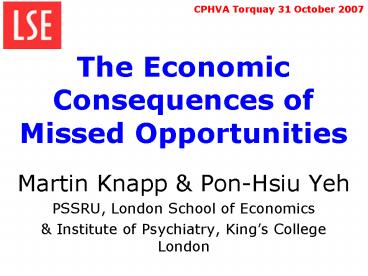Martin Knapp - PowerPoint PPT Presentation
1 / 23
Title:
Martin Knapp
Description:
... can help to reduce symptoms [E.g. Jane Morrell's recent study of CBT or person ... Thomas & Morris Brit J Psychiatry 2003. Excluding morbidity' costs ... – PowerPoint PPT presentation
Number of Views:48
Avg rating:3.0/5.0
Title: Martin Knapp
1
CPHVA Torquay 31 October 2007
The Economic Consequences of Missed Opportunities
- Martin Knapp Pon-Hsiu Yeh
- PSSRU, London School of Economics
- Institute of Psychiatry, Kings College London
2
Health visitors can be effective
- Parenting skills and quality of the home
environment - Amelioration of child behavioural problems,
including sleeping behaviour - Improved intellectual development, esp. with low
birth weight or failure to thrive - Reduction in frequency of unintentional injury,
and reduction in prevalence of home hazards - Improvements in detection and management of
postnatal depression - Enhancement of quality of social support to
mothers - Improved rates of breastfeeding
Elkan et al HTA 2000
3
but are they cost-effective?
- The cost for a health visitor per hour of client
contact 72 (and is 84 if proper allowance
made for training etc) - The costs of referrals on to other professionals
or services can be high - Some (many?) families dont really need health
visitor support but currently get it - And some (many?) could afford to pay for it
themselves - And resources are scarce there is never enough
to meet all needs or demands - So we need to think cost-effective Is it
worth spending money to prevent or treat?
Crunch question Is it worth it?
4
- 1
- Economics. So why is it relevant?
- Scarcity
- Rationing
- Careful choice
5
- 2
- Health visitors and postnatal depression
6
Health visitors can help women with postnatal
depression
- HVs are effective in identifying PND and
referring on to GP or others Numerous studies
reviewed by Elkan et al. 2000 - HVs delivering psychological therapies can help
to reduce symptoms E.g. Jane Morrells recent
study of CBT or person-centred approach - Preventive counselling begun antenatally for
women at high risk, plus postnatal support and
counselling up to 8 weeks reduces duration of
symptoms Lynne Murrrays study in Reading
7
And some evidence of short-term cost-effectiveness
- Lynne Murrays trial of preventive counselling
and postnatal support and counselling - significantly reduced duration of depression by
2 weeks over 18 months - but (non-significantly) increased health and
social care costs by 120
Crunch question Is it worth it?
Petrou et al IJTAHC 2006
8
And some evidence of short-term cost-effectiveness
- Lynne Murrays trial of preventive counselling
and postnatal support and counselling - significantly reduced duration of depression by
2 weeks over 18 months - but (non-significantly) increased health and
social care costs by 120 - The cost per additional depression-free day was
1.42 - and this high probability of being seen as
cost-effective by decision makers
Petrou et al IJTAHC 2006
9
- 3
- Depression has longer term and wider effects and
costs
10
Costs of depression (adults) in England, 2000
Excluding morbidity costs
Thomas Morris Brit J Psychiatry 2003
11
Cost of depression (all adults) in England, 2000
Total cost 9 billion
Thomas Morris Brit J Psychiatry 2003
12
- 4
- Postnatal depression harms children
13
Maternal depression has harmful effects on
children 2 examples
- Lynne Murray et al (1999) ? children at age 5 did
less well in relation to - behaviour with mother
- behavioural disturbance at home
- content and social patterning of play at school
- Dale Hay et al (2001) ? children at age 11 did
less well in relation to - IQ
- attentional problems
- mathematical reasoning
- Special educational needs
Murray et al JCPP 1999 Hay et al JCPP 2001
14
And these child effects are costly - persistent
antisocial behaviour
Total cost excluding benefits averaged 5960 per
child per year, at 2000/01 prices (benefits
4307)
Romeo, Knapp Scott, Brit J Psychiatry, 2006
15
- 5
- Adverse childhood effects have long-term impacts
16
Example 1 the Inner London Longitudinal Study
- Study of all 10-year olds in part of London in
1970 (Michael Rutter) - Teacher ratings, child questionnaires
- Plus intensive further assessment of some
- At age 10
- No problems at school, no clinical diagnosis (65)
- Emotional problems at school, only (32)
- Emotional disorder (8)
- Antisocial behaviour at school, only (61)
- Conduct disorder (16)
- Followed up at age 26-28
- Later we calculated costs from 10 to 28
17
Costs in early adulthood from childhood conduct
disorder
Costs () from ages 10 to 28
Scott, Knapp, Henderson, Maughan, BMJ 2001
18
Example 2 the 1970 British Birth Cohort Study
- 17,198 children born in UK during 1 week in April
1970 - Subsequent collections at ages 5, 10, 16, 26, 30
- 11,261 people successfully followed up at age 30
- Andrew Healey (PhD thesis, LSE) What is
connection between mental health problems at age
10 and employment and income experiences at age
30?
19
BCS70 From age 10 to age 30 (adjusting for
baseline covariates)
Healey, unpublished results, LSE, 2005
20
BCS70 From age 10 to age 30 (adjusting for
baseline covariates)
Healey, unpublished results, LSE, 2005
21
- 6
- What needs to be done?
22
What needs to be done?
- 1. Please dont shoot the messenger
- 2. But do heed the message
- Resources are scarce
- Rationing is inevitable (weve always had it)
- Economic analysis helps it is transparent,
structured, has a rational basis, and is now
widely accepted as a contributor to decision
making - 3. Sometimes there are quick fixes
- 4. But services that aim to set in place good
parenting cannot be judged by just their
short-term impacts - 5. We need long-term social and economic
perspectives on long-term social and economic
challenges
23
m.knapp_at_lse.ac.uk
www.pssru.ac.uk
www.iop.kcl.ac.uk and search on CEMH































